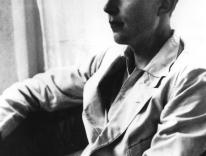Each year Pope Benedict meets with the seminarians of the Diocese of Rome and engages with them in "lectio divina:" an in-depth meditation on a passage of Scripture. His text this year was Romans 12:1&2. Here is a part of his reflection:
What is Paul appealing for in this regard? Present your bodies as a living sacrifice, holy and acceptable to God (v. 1). Present your bodies: he speaks of the liturgy, he speaks of God, of the priority of God but he does not speak of the liturgy as a ceremony, he speaks of the liturgy as life. We ourselves, our body; we in our body and as a body must be liturgy. This is the newness of the New Testament, and we shall see it again later: Christ offers himself and thereby replaces all the other sacrifices. And he wants to draw us into the communion of his Body. Our body, with his, becomes Gods glory, becomes liturgy. Hence this term present in Greek parastesai is not only an allegory; allegorically our life would also be a liturgy but, on the contrary, the true liturgy is that of our body, of our being in the Body of Christ, just as Christ himself made the liturgy of the world, the cosmic liturgy, which strives to draw all people to itself.In your body, present your body: these words indicate man in his totality, indivisible in the end between soul and body, spirit and body; in the body we are ourselves and the body enlivened by the soul, the body itself, must be the realization of our worship. And we think perhaps, I would say, each one of us should then reflect on these words that our daily life in our body, in the small things, must be inspired, profuse, immersed in the divine reality, it must become action together with God. This does not mean that we must always be thinking of God, but that we must really be penetrated by the reality of God so that our whole life and not only a few thoughts may be a liturgy, may be adoration.
The rest is here.


